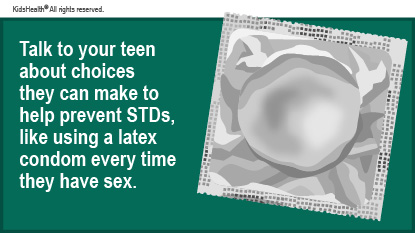Genital warts are warts near the vagina, penis, or anus. They are caused by HPV (short for human papillomavirus). The virus spreads through sex or close sexual contact with an infected person. Treatments can reduce the number of warts or help them go away faster, but the warts often come back. And even if the warts go away, HPV might still be in the body and can spread to other people. HPV goes away in most people within about 2 years.


Treatment
Follow-up

Your teen:

How are genital warts spread? The HPV that causes genital warts usually spreads through vaginal, oral, or anal sex. It can also spread by touching the area near the genitals. After a person is infected, warts may show up within weeks or years. This makes it hard to know exactly when someone was infected. Not everyone with HPV gets warts. Even without warts, an infected person can spread the virus to others.
When is my teen no longer contagious? It's hard to know exactly when someone with HPV is no longer contagious. Usually, the HPV is gone from the body within 2 years of getting infected. In some people, the virus stays longer.
Do genital warts increase my teen's risk of cancer? The type of HPV that causes genital warts usually does not lead to cancer. But other types of HPV do increase the risk of cancer, so it's very important for your teen to get all doses of the HPV vaccine.
How can my teen avoid getting another STI? The best way to avoid an STI is not to have sex (vaginal, oral, or anal). To lower their chances of another infection, people who do have sex should: